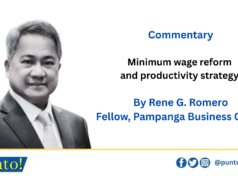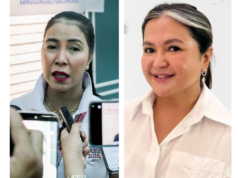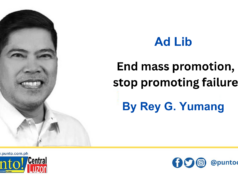CLARK FREEPORT — Is there an effective way to curb a repeat of the recently uncorked P10-billion “pork barrel” scam now scandalizing the nation? This was the question that former Bulacan Rep. Willy Villarama tried to answer in last Friday’s weekly media forum “Balitaan” of the Capampangan in Media, Inc. (CAMI) at the Bale Balita here.
The politician who is also an offi cer of Buhay Partylist told his audience of CAMI members and guests that the scam allegedly masterminded by Janet Lim-Napoles was a result of the “weak and corrupt system of governance prevailing in the country.”
It being so, he declared that he was “positive that a way could be found to reduce, if not immediately eliminate, corrupt practices in government, and even in the private sector for that matter.”
Doing so will not be easy, he explained, adding that any move to curb corruption in a society like the Philippines will require the involvement of a vigilant public, especially courageous individuals – the whistleblowers — as in the case of the uncovered P10-billion pork barrel scam.
Benhur Luy, a nephew and former employee of Napoles, exposed the systematic looting of the people’s money under the pork barrel system in government out of fear and obviously to get back at his ex-employer whom he accused of illegally detaining him due to imagined infractions of company regulations and disloyalty.
His revelations brought to light the supposed active participation of a good number of lawmakers, top ranking and ordinary government bureaucrats and private individuals in the theft of public funds lodged in the government’s national budget known as the Priority Assistance Development Fund (PDAF).
The fund is for the exclusive use of senators that get an annual allocation of P200 million each and members of House Representatives that each gets a P70-million yearly allotment for the financing of their pet projects in the form of roads, buildings and other infrastructure, relief and medical assistance to their constituents and education-linked activities.
Villarama said this system was devised to ensure the lawmakers’ support for the President’s pet proposed bills, programs and policies. He said the lawmakers’ take from this arrangement is a boost to their re-election bids.
But the lawmakers would need to have a key to gain access to this people’s fund, Villarama noted. And that key comes in the form of projects fronted by non-government organizations (NGOs) and foundations that represent “qualifi ed” constituents such as farmers, students, indigents and poor communities, victims of calamities, etc.
But in the uncovered scam of Napoles, bogus NGOs/foundations and spurious government documents were allegedly used to secure the release of the funds that went straight into the pockets of the Napoles cabal which included senators, congressmen, bureaucrats and their private sector partners.
Luy’s allegations were buttressed by other former employees or insiders of Napoles’ camp, prompting an official government probe into the matter and the filing last week of complaints against the members of the Napoles gang before the Office of the Ombudsman.
Without these “whistleblowers” in the persons of Luy and company, the Napoles scheme would have remained a secret and continued the misuse of the people’s money, the former lawmaker pointed out, even as he pressed for the creation of a group or groups in the private sector to operate as dedicated whistleblowers.
“We, at least the majority of us, must be ‘whistleblowers’ in order to check the activities of grafters and corrupt members of our society,” Villarama said, stressing it is imperative for the public (private individuals and groups) to take the lead in the fight against corruption.
Government or people in government can never be fully relied upon to fight corruption, he stressed, as this will naturally work against their personal interest, besides being prone to “peer pressure.”
He said, government’s role (or that of a state agency) in any anti- corruption drive should be limited to the adoption of policies, programs and laws that will protect whistleblowers from harassment and physical/ financial harm and official investigation of uncovered anomalies and prosecution of erring parties.
Villarama noted that a growing number of countries have initiated steps to lick corruption in both the official and private circles by encouraging “whistleblowing” by the public against corrupt activities in government and even private enterprises imbued with public interest, like power companies, telecommunications entities and other utilities.
The United States, for instance, enacted The Whistleblower Protection Act of 1989 in a bid to encourage people to report any law violations, gross waste of funds, and abused of authority by federal employees.
It also put in place a “Whistleblower Protection Program” being run by the Occupational Safety & Health Administration (OSHA) to provide a shield to employees and other personnel that report violations of various work-places, like in airlines, commercial motor carriers, consumer product manufacturers, etc.
India’s private group, Janaagraha, has even started to operate a website – ipaidbribe.com – as a way of encouraging ordinary individuals to help curb and, eventually, eliminate corruption.
Brazil, too, just recently followed suit in the global trend to fight corruption by passing a law which imposes stiff administrative and criminal actions against foreign and domestic companies that bribe government officials.




